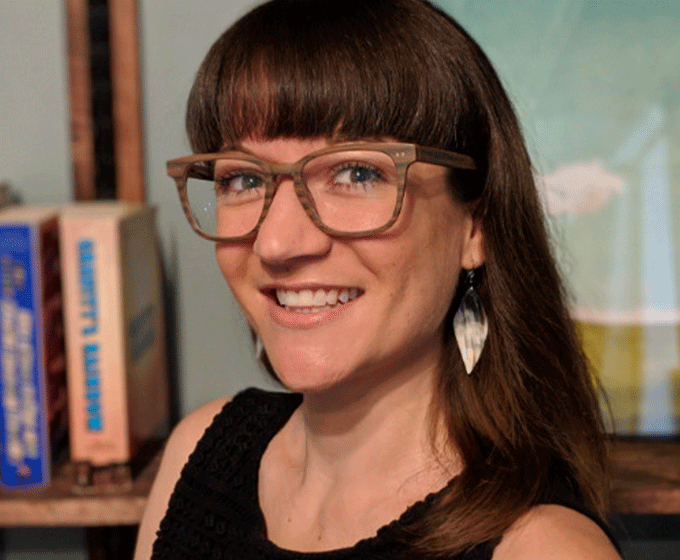
FEBRUARY 21, 2023 — Whitney Chappell, associate professor in the UTSA Department of Modern Languages and Literatures, set out to tell the stories of how the coronavirus pandemic altered San Antonio’s Hispanic community. Through her COVID-19 Oral History Project, she created an extensive video collection of people with different perspectives and attitudes toward one of the world’s most defining health crises.
“I proposed this project at the beginning of the pandemic, because I really wanted to explore, especially within the local Hispanic community, how all these different areas of life—family, work, health—were being impacted by COVID,” she said. “It was a really interesting project and heartbreaking at times because a lot of people had some devastating stories to tell.”
From November 2020 to December 2021, Chappell and her trained team of bilingual students conducted more than 100 video interviews in English, Spanish and a mix of both languages. Interviewees shared how the pandemic uprooted almost every area of their lives.
 Whitney Chappell
Whitney ChappellThrough a series of targeted questions, they became the narrators of their own story by recounting their experiences with sickness, mental health, media coverage and the government’s response to the pandemic.
“We started with biographical questions to get to know the person and then shifted to asking them to reflect on what happened and how they felt early in the pandemic to how they felt months into it,” Chappell said. “We let them share what was important to them and not force them to talk about all this other stuff that’s not really relative to their lives and their experience.”
Chappell continued, “Some wanted to talk about their community; others wanted to focus on their kids or a health scare they had during this time.”
Interviewers recruited people for this project by visiting local organizations such as the Guadalupe Cultural Arts Center and by word of mouth—recruiting friends, co-workers and UTSA students. Interviewees ranged from college students to older adults.
“At first I think they were exaggerating,” interviewee Michael Juarez said in his video recorded in early 2021. “I didn’t really believe it, but later on I did. I thought they were exaggerating just to scare people.”
Juarez, who was working at a local hospital at that time, said he didn’t see locally what was being described in cities such as New York where the pandemic struck hardest in the beginning.
Daniela Bonilla, who also was interviewed in early 2021, said that the pandemic caused strained relationships with friends and her ability to socialize within her community as normal.
“I think all of my friends have continued to go out and party,” she said in her video. “And, like for me, that’s not a choice, you know? I help take care of my grandparents and I live in a community where I can’t just think about myself and my needs. So, it’s hard.”
Others expressed fear over financial pressure from losing their job or having to move back in with family where relationships were already strained before the pandemic. One interviewee described going days without speaking to anyone, and how it took time to readjust to doing simple things like being around people in public spaces.
Chappell was awarded UTSA’s Lutcher Brown Professorship in 2020, which provided funding for her project, including gift cards to compensate interviewers and interviewees for their time and participation, and for those who transcribed the interviews.
The project, which took almost two years to complete, was another way UTSA could engage with the Hispanic community while documenting one of the most life altering events in history.
“The pandemic was a traumatic time, very isolating, and it was upsetting for everybody and lots of us lost people we loved,” Chappell said. “I thought if this is anything like the Spanish flu pandemic, people are going to go through it, move on and never talk about it again. We’re not going to have a lot of good records about this period.”
She added, “All you’ll have is a bunch of hard data, a bunch of numbers, but you don’t have stories. Stories make lived experiences come alive and connect people in ways that numbers just don’t.”
UTSA Today is produced by University Communications and Marketing, the official news source of The University of Texas at San Antonio. Send your feedback to news@utsa.edu. Keep up-to-date on UTSA news by visiting UTSA Today. Connect with UTSA online at Facebook, Twitter, Youtube and Instagram.
Move In To COLFA is strongly recommended for new students in COLFA. It gives you the chance to learn about the Student Success Center, campus resources and meet new friends!
Academic Classroom: Lecture Hall (MH 2.01.10,) McKinney Humanities BldgWe invite you to join us for Birds Up! Downtown, an exciting welcome back event designed to connect students with the different departments at the Downtown Campus. Students will have the opportunity to learn about some of the departments on campus, gain access to different resources, and collect some giveaways!
Bill Miller PlazaCome and celebrate this year's homecoming at the Downtown Campus with food, games, giveaways, music, and more. We look forward to seeing your Roadrunner Spirit!
Bill Miller PlazaThe University of Texas at San Antonio is dedicated to the advancement of knowledge through research and discovery, teaching and learning, community engagement and public service. As an institution of access and excellence, UTSA embraces multicultural traditions and serves as a center for intellectual and creative resources as well as a catalyst for socioeconomic development and the commercialization of intellectual property - for Texas, the nation and the world.
To be a premier public research university, providing access to educational excellence and preparing citizen leaders for the global environment.
We encourage an environment of dialogue and discovery, where integrity, excellence, respect, collaboration and innovation are fostered.